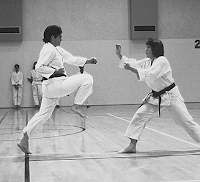
In karate, there are two concepts that come into play, kime (key-meh) and zanshin (zahn-sheen). There are whole chapters dedicated to each in various books, so I'll just squish the descriptions down for brevity's sake.
The first, kime, is the focus of all your intention on one point in time and space. A good example of this would be in breaking wooden boards or concrete slabs. Without the willpower to hit through the object, doubt gets in the way and manifests itself as failure - which, in this case, would result in serious injury as the force rebounds onto the striking limb instead of penetrating through!
The second, zanshin, is having awareness of your surroundings, but in a passive manner. It's almost the lack of focus on anything fixed. You could almost compare it to the idea of a "sixth sense" in where someone might react physically without consciously thinking about doing so.
So how, if at all, do either of those concepts apply to taiko? How do you utilize two concepts which seem mutually exclusive?
A computer, even though it may seem otherwise, can't do two things at the same time. It rapidly shifts between tasks extremely quickly. In a way, we do the same when we play taiko. There are some actions that immediately take us out of either kime or zanshin, but we may snap right back in without realizing it.
For example, to kiai is to use kime. The "ki" in those words is not the same kanji, and does not have the same meaning. Nevertheless, to kiai is to focus energy from the hara, the center of being, through the mouth. Even if you try to do it lackadaisically, you still have to focus your muscles to do it with any sort of technique.
On the other hand, when someone says, "I was in the zone," this is a great example of zanshin. Being "in the zone" usually means you feel exactly where you and the ensemble are musically, and if you happen to be improvising, your solo is almost playing itself. Once you start to actually realize and think to yourself, "hey, I'm in the zone," you stop being in the zone. Why? Because you're starting to use focus in a state of passive awareness. It's like being aware you're dreaming just before you start to fall asleep, which wakes you up.
I can think of several other examples, but I want you to think of your own. When do you feel kime and zanshin? If not, why not? Can an entire group have either concept? Have you ever felt "bad" kime or "weak" zanshin?
For some reason, I'm getting a lot of spam comments on this one post. Never click on any link you see in the comments unless you're very sure it's legit. That goes for this post or any of my posts.
ReplyDelete